
DUBAI, United Arab Emirates (AP) — Yemen’s Houthi rebels vowed fierce retaliation Friday for American and British strikes against them, further raising the prospect of a wider conflict in a region already beset by Israel’s war in Gaza.
The bombardment — launched in response to a recent campaign of drone and missile attacks on commercial ships in the vital Red Sea — killed at least five people and wounded six, the Houthis said.
As the bombing lit the predawn sky over multiple sites held by the Iranian-backed rebels, it forced the world to again focus on Yemen’s yearslong war, which began when the Houthis seized the country’s capital.
Since November, the rebels have repeatedly targeted ships in the Red Sea, saying they were avenging Israel’s offensive in Gaza against Hamas. But they have frequently targeted vessels with tenuous or no clear links to Israel, imperiling shipping in a key route for global trade and energy shipments.
Though the Biden administration and its allies have tried to calm tensions in the Middle East for weeks and prevent any wider conflict, the strikes threatened to ignite one.
Saudi Arabia — which supports the government-in-exile that the Houthis are fighting — quickly sought to distance itself from the attacks as it seeks to maintain a delicate détente with Iran and a cease-fire it has in Yemen.
The Houthis’ military spokesman, Brig. Gen. Yahya Saree, said in a recorded address that the strikes would “not go unanswered or unpunished.”
He said strikes on regions of Yemen under their control killed five and wounded six from the rebels’ military forces. It remained unclear how extensive the damage was, though the Houthis said at least five sites, including airfields, had been attacked.
The United Kingdom said strikes hit a site in Bani allegedly used by the Houthis to launch drones and an airfield in Abbs used to launch cruise missiles and drones.
Hussein al-Ezzi, a Houthi official in their Foreign Ministry, that “America and Britain will undoubtedly have to prepare to pay a heavy price and bear all the dire consequences of this blatant aggression.”
The Red Sea route is a crucial waterway, and attacks there have caused severe disruptions to global trade. Benchmark Brent crude oil traded up some 4% Friday at over $80 a barrel. Tesla, meanwhile, said it would temporarily halt most production at its German factory because of attacks in the Red Sea.
Meanwhile, the U.S. Navy acknowledged an attack days earlier on a ship in the far reaches of the Indian Ocean — an attack that may signal Iran’s willingness to strike vessels as part of a wider maritime campaign over the Israel-Hamas conflict.
Tehran on Thursday separately seized another tanker.
In Saada, the Houthis’ stronghold in northwest Yemen, hundreds gathered for a rally Friday, denouncing the U.S. and Israel. Another drew thousands in Sanaa, the capital.
Yemen has been targeted by U.S. military action over the last four American presidencies. A campaign of drone strikes began under President George W. Bush to target the local affiliate of al-Qaida, attacks that have continued under the Biden administration. Meanwhile, the U.S. has launched raids and other military operations amid the ongoing war in Yemen.
That war began when the Houthis swept into Sanaa in 2014. A Saudi-led coalition including the United Arab Emirates launched a war to back Yemen’s exiled government in 2015, quickly morphing the conflict into a regional confrontation as Iran backed the Houthis with weapons and other support.
That war, however, has slowed as the Houthis maintain their grip on the territory they hold. In March, Saudi Arabia reached a Chinese-mediated deal to restart relations with Iran in hopes of ultimately withdrawing from the war.
However, an overall deal has yet to be reached, likely sparking Saudi Arabia’s expression Friday of “great concern” over the airstrikes.
“While the kingdom stresses the importance of preserving the security and stability of the Red Sea region ... it calls for restraint and avoiding escalation,” its Foreign Ministry said in a statement.
Iran condemned the attack in a statement from Foreign Ministry spokesperson Nasser Kanaani.
“Arbitrary attacks will have no result other than fueling insecurity and instability in the region,” he said.
In Beijing, Chinese Foreign Ministry spokeswoman Mao Ning called on nations not to escalate tensions in the Red Sea.
Oman, long a regional interlocutor for the U.S. and the West with Iran, condemned the airstrikes. It called the attack a “great concern while Israel continued its brutal war and siege of the Gaza Strip without accountability or punishment.”
Meanwhile Friday, the U.S. Navy confirmed an attack days earlier near the coasts of India and Sri Lanka. The chemical tanker Pacific Gold was struck Jan. 4 by what the Navy called “an Iranian one-way attack” drone, causing some damage to the vessel but no injuries.
The Pacific Gold is managed by Singapore-based Eastern Pacific Shipping, a company that is ultimately controlled by Israeli billionaire Idan Ofer. Iran itself has not acknowledged carrying out the attack.




